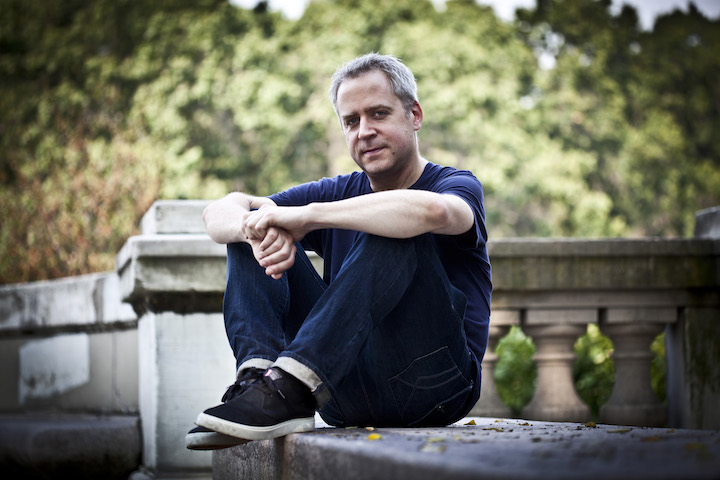
Before getting to favourite albums of 2013, I want to tip my tuque and wave my wooly scarf to ex-CBC hosts Eric Friesen and Bill Richardson and their brave comrades at new radio station Classic 107 in Winnipeg, dedicated to keeping art music on the airwaves.
- Classical Music 101: What Does A Conductor Do? - June 17, 2019
- Classical Music 101 | What Does Period Instrument Mean? - May 6, 2019
- CLASSICAL MUSIC 101 | What Does It Mean To Be In Tune? - April 23, 2019
I’ve listened to something like 300 albums in 2013. I tend to review only the ones I find particular merit in, unless they are from such big names that I can’t ignore them. The ones that don’t tickle my aesthetic g-spot get immediately tossed into the discard pile, so it’s pointless to put together a Worst-of-2013 list.
28 albums, including 13 Canadian ones, made it to my Best-of-2013 list. I’ve winnowed them down to two albums of the year and six Canadian favourites noteworthy in some special way.
Albums of the Year: J.S. Bach’s Goldberg Variations
Oh, those Goldberg Variations: the pieces that were supposedly unplayable on a single keyboard (they were written for a harpsichord with two manuals); sterile little mathematical puzzles; technical exercises; yet they made an eccentric Toronto pianist world-famous and that have, since then, emerged as one of the touchstones of Western art music.
If all the hundreds upon hundreds of new releases of 2013 were to be suddenly swallowed up in a Florida sinkhole, the two that I would cry over would both feature the Goldberg Variations — published in 1741 by Johann Sebastian Bach and reimagined in 2013 (let’s accept the release date as our point of reference) by American pianist Jeremy Denk and Toronto composer Michael Colgrass.
Both of their musical visions are pure magic. Both begin with the same raw material — an uncanny puzzle of counterpoints, easily categorized as the singular work of extraterrestrial genius — in order to clarify it and lay it out with a beguiling, smiling, sometimes even laughing humanity.
As Denk wrote for NPR in the weeks leading up to the release of his Nonesuch album:
I often talk about Bach as a great humanist, as having an empathy for the whole range of human emotion. (Rather than the cerebral, fugal stereotype.) I love the way his music seems to look down on the whole human deal, but not condescendingly, with (now I’m letting myself rhapsodize subjectively) a kind of benevolent understanding. He does not look down bitterly (like Shostakovich, for instance), saying look at this terrible empty comedy of human emotion. Nor is he himself the emoter, like Beethoven; but he is not distanced, either. He has hit a sweet spot. Perhaps the most serious complaint you could make about Bach is that he has every quality of humanity except imperfection.
There are many excellent recordings of the Goldberg Variations out there, for all sorts of instruments. But these two hit their own sweet spot in ways that continue to leave me slack-jawed in admiration.
For my original review of Denk’s Goldbergs, click here.
It is one thing to interpret music as a soloist, engaging in a one-on-one relationship with an original score. Composer and arrangers, like Michael Colgrass, have to translate their vision into a set of instructions that can then be passed along to one or many interpreters who will then be able to bring it to life.
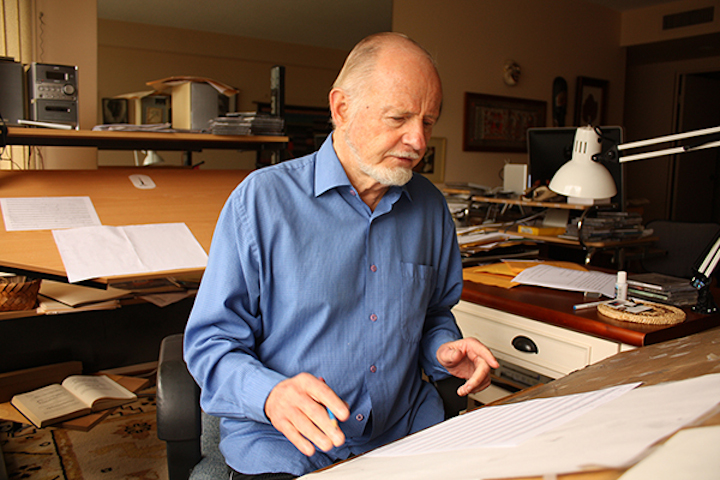
Colgrass’s Goldbergs do everything Denk’s do — that is, become music with a beating human heart at its centre — but in a very different style, using an orchestra. It works as compelling listening, but it also satisfies the analytical mind. Like dye injected into the bloodstream of a cardiac patient, Colgrass’s highly sophisticated instrumentation illustrates, illuminates and guides us through Bach’s musical maze.
For my original review of Colgrass’s Goldbergs, click here.
Denk’s recording also inspired me to write a short meditation here.
6 Canadian favourites
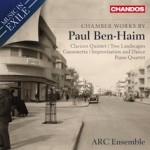 ARC Ensemble: Chamber Works by Paul Ben-Haim — These great Toronto musicians, all associated with the Royal Conservatory of Music, choose what they say musically very carefully. So, when they do have something to play, it’s worth listening. Check out my review here.
ARC Ensemble: Chamber Works by Paul Ben-Haim — These great Toronto musicians, all associated with the Royal Conservatory of Music, choose what they say musically very carefully. So, when they do have something to play, it’s worth listening. Check out my review here.
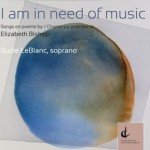 Suzie LeBlanc and friends: I Am in Need of Music — This album embodies a chain of inspiration, from poet to singer to composers to interpreters and back again, that then clamps its warm rings around the listener’s soul. Check our my review here.
Suzie LeBlanc and friends: I Am in Need of Music — This album embodies a chain of inspiration, from poet to singer to composers to interpreters and back again, that then clamps its warm rings around the listener’s soul. Check our my review here.
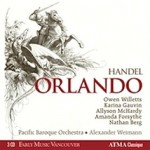 Pacific Baroque Orchestra and friends: Handel Orlando — George Frideric Handel, the German transplanted to England at his Italian-operatic best, rendered vibrantly by some of our finest singers is a big smile from beginning to end. Check out my review here.
Pacific Baroque Orchestra and friends: Handel Orlando — George Frideric Handel, the German transplanted to England at his Italian-operatic best, rendered vibrantly by some of our finest singers is a big smile from beginning to end. Check out my review here.
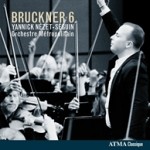 Orchestre Métropolitain: Bruckner 6 — Conductor Yannick Nézet-Séguin and the Montrealers that gave him a start are remarkable in this, their fifth stab at the ferociously challenging symphonies of Anton Bruckner. It was my favourite, so far. In my review (here), I wrote: “If life is an ongoing, utterly unpredictable dance between happiness and grief, this is its musical expression.”
Orchestre Métropolitain: Bruckner 6 — Conductor Yannick Nézet-Séguin and the Montrealers that gave him a start are remarkable in this, their fifth stab at the ferociously challenging symphonies of Anton Bruckner. It was my favourite, so far. In my review (here), I wrote: “If life is an ongoing, utterly unpredictable dance between happiness and grief, this is its musical expression.”
 Ensemble Made In Canada: Mozart Piano Quartet No. 2, Brahms Piano Quartet No. 3 — Crowdfunded and self-produced the 21st century way, yet performed with timeless care, this is favourite chamber music delivered on a beautifully polished silver platter. Check out my review here.
Ensemble Made In Canada: Mozart Piano Quartet No. 2, Brahms Piano Quartet No. 3 — Crowdfunded and self-produced the 21st century way, yet performed with timeless care, this is favourite chamber music delivered on a beautifully polished silver platter. Check out my review here.
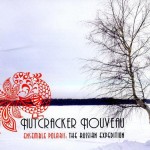 Ensemble Polaris: Nutcracker Nouveau — Tchaikovsky’s Nutcracker score like you’ve never heard it before, with fun little extras poking out like sprinkles on a gingerbread figure. You can check out my review here. In the spirit of the season, Ensemble Polaris is offering up this music in concert on Dec. 28 at The 918 (918 Bathurst St, north of Bloor St), at 8 p.m. Ticket information here.
Ensemble Polaris: Nutcracker Nouveau — Tchaikovsky’s Nutcracker score like you’ve never heard it before, with fun little extras poking out like sprinkles on a gingerbread figure. You can check out my review here. In the spirit of the season, Ensemble Polaris is offering up this music in concert on Dec. 28 at The 918 (918 Bathurst St, north of Bloor St), at 8 p.m. Ticket information here.
A blast from 2012
The final album I reviewed in 2012 — exactly a year ago today — featured Symphony No. 1 by now-obscure Italian composer Giovanni Sgambati (1841-1914). I was blown away by the quality of his writing in this five-movement work and promised to return during 2013 to write a “salon des oubliés” feature on his music.
Well, I completely forgot.
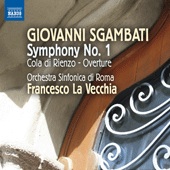 Last night, I found the CD case in a little pile of favourites I’d set aside for further listening. I hadn’t listened again, so, as I worked on pulling together this post, I slid the disc into my player and savoured this fine music again. It wasn’t just a mood, or a passing fixation; this music is good.
Last night, I found the CD case in a little pile of favourites I’d set aside for further listening. I hadn’t listened again, so, as I worked on pulling together this post, I slid the disc into my player and savoured this fine music again. It wasn’t just a mood, or a passing fixation; this music is good.
If this doesn’t ring any bells, you can find my review here — and find out more about the album here.
So, perhaps my resolution to revisit Sgambati will stick in 2014, which is the 100th anniversary of his death. And we all love anniversaries, right?
John Terauds
- Classical Music 101: What Does A Conductor Do? - June 17, 2019
- Classical Music 101 | What Does Period Instrument Mean? - May 6, 2019
- CLASSICAL MUSIC 101 | What Does It Mean To Be In Tune? - April 23, 2019



